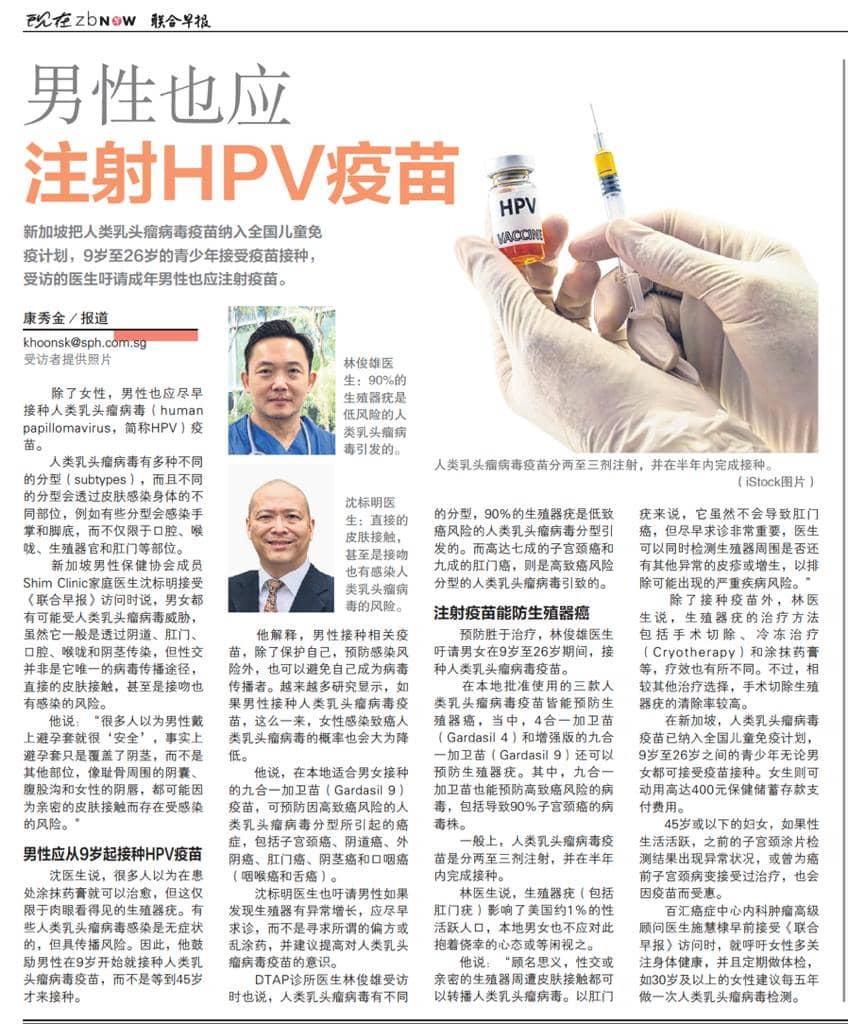Dr. Shim recently contributed to a Singapore local Chinese language newspaper on the topic of HPV vaccination for males.
Here is the English translation:
Besides females, males should also get vaccinated against the human papillomavirus(HPV) STD as soon as possible.
There are many subtypes of the human papillomavirus, and each different subtype infects a different part of the body through the skin. For instance, certain subtypes of the virus infect the palms and feet and not just body parts such as the mouth, the throat, the reproductive organs and the anus.
Ivan Shim, a family doctor at Shim Clinic, a STD clinic in Singapore, and a member of the Society for Men’s Health Singapore said in a interview with Chinese daily Lianhe Zaobao that both men and women are at risk of contracting the human papillomavirus. He said that although the virus usually spreads through the vagina, anus, mouth, throat or penis, sexual intercourse is not its only means of transmission, and that direct skin contact or even kissing could also pose a risk of infection.
He said, “a lot of people think it’s very ‘safe’ as long as the man involved wears a condom, but actually, condoms only cover the penis and not other areas such as the scrotum around the pubic bone, the groin and the woman’s labia which are all prone to infection through physical contact.”
Males should be vaccinated against HPV from as early as 9.
According to Dr. Shim, a lot of people think that the disease can be cured just by applying an ointment over the affected area, but this only applies to genital warts which are visible to the naked eye. Some cases of human papillomavirus can be asymptomatic but infectious. Therefore, he encourages males to get vaccinated against HPV from as early as 9 rather than waiting till they are 45.
He explained that by getting the relevant vaccines, males can not only protect themselves from the risk of infection, but also prevent themselves from becoming spreaders of the virus. A growing number of researches have shown that the chances of females contracting the carcinogenic human papillomavirus would decrease greatly if men are vaccinated against the virus.
He said that the locally available Gardasil 9 vaccine which is suitable for both genders prevents cancers caused by the highly-carcinogenic human papillomavirus subtypes, including cervical cancer, vaginal cancer, vulvar cancer, anal cancer, penile cancer and oropharyngeal cancer (throat cancer and tongue cancer).
Dr. Ivan Shim also urged men to seek treatment as soon as they notice abnormal growth in their reproductive organ instead of resorting to so-called home remedies or applying medication indiscriminately. He also suggested that awareness be raised of the human papillomavirus.
Dr. Lim Chun Siong from DTAP Clinic also said in an interview that there are different subtypes of the human papillomavirus; 90% of all genital warts cases are caused by mildly-carcinogenic human papillomavirus subtypes, while up to 70% of cervical cancer cases and 90% of anal cancer cases are caused by highly-carcinogenic subtypes of the virus.
Getting vaccinated helps prevent genital cancer
Prevention is better than cure. Dr. Lim Chun Siong urges both males and females to get vaccinated against the human papillomavirus between the ages of 9 and 26.
All three locally approved human papillomavirus vaccines effectively protect against genital cancers, and two of which, Gardasil 4 and Gardasil 9 also protect against genital warts. The Gardasil 9 vaccine is also capable of preventing highly-carcinogenic viruses, including the virus that causes 90% of cervical cancer cases.
Generally, human papillomavirus vaccines require two to three separate doses, with all doses to be completed over the span of half a year.
Dr. Lim said that genital warts (including anal warts) affect 1% of sexually-active Americans and warned local men and women not to simply leave things to chance and take the disease lightly.
He said, “As its name suggests, the human papillomavirus can be transmitted through sexual intercourse or intimate skin contact around the reproductive organs. Take anal warts as an example. Though it doesn’t cause anal cancer, it’s crucial to seek early treatment so that a doctor can inspect whether there are other abnormal skin rashes or growth in areas around the reproductive organ in order to eliminate the risk of potential severe diseases.”
Other than getting vaccinated, Dr. Lim said that other treatment methods include surgical removal, cryotherapy and ointment application, each with varying results. However, compared with the other methods, surgically removing genital warts has a higher rate of removal.
In Singapore, the human papillomavirus vaccine has been included in the National Childhood Immunisation Schedule (NCIS). Adolescents and young adults aged 9 to 26 can receive the vaccination regardless of gender. Females can utilise up to 400 dollars from their Medisave to pay for the vaccination.
Sexually-active women aged 45 and under who had previously received abnormal results for their pap smear test or those who had received treatment for precancerous cervical lesions in the past will also benefit from taking the vaccine.
In an interview (with Chinese daily Lianhe Zaobao), Dr. See Hui Ti, Senior Consultant of Medical Oncology at Parkway Cancer Centre urged for women to pay attention to their health and go for regular check-ups. She recommended that women aged 30 and above go for a human papillomavirus test every five years.

